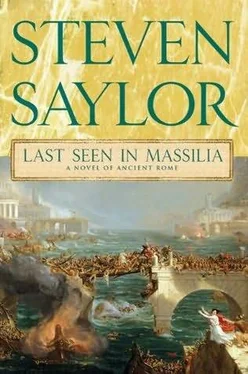Steven Saylor - Last seen in Massilia
Здесь есть возможность читать онлайн «Steven Saylor - Last seen in Massilia» весь текст электронной книги совершенно бесплатно (целиком полную версию без сокращений). В некоторых случаях можно слушать аудио, скачать через торрент в формате fb2 и присутствует краткое содержание. Жанр: Исторический детектив, на английском языке. Описание произведения, (предисловие) а так же отзывы посетителей доступны на портале библиотеки ЛибКат.
- Название:Last seen in Massilia
- Автор:
- Жанр:
- Год:неизвестен
- ISBN:нет данных
- Рейтинг книги:3 / 5. Голосов: 1
-
Избранное:Добавить в избранное
- Отзывы:
-
Ваша оценка:
- 60
- 1
- 2
- 3
- 4
- 5
Last seen in Massilia: краткое содержание, описание и аннотация
Предлагаем к чтению аннотацию, описание, краткое содержание или предисловие (зависит от того, что написал сам автор книги «Last seen in Massilia»). Если вы не нашли необходимую информацию о книге — напишите в комментариях, мы постараемся отыскать её.
Last seen in Massilia — читать онлайн бесплатно полную книгу (весь текст) целиком
Ниже представлен текст книги, разбитый по страницам. Система сохранения места последней прочитанной страницы, позволяет с удобством читать онлайн бесплатно книгу «Last seen in Massilia», без необходимости каждый раз заново искать на чём Вы остановились. Поставьте закладку, и сможете в любой момент перейти на страницу, на которой закончили чтение.
Интервал:
Закладка:
"Brave men of Massilia! For long months we've endured the humiliations and deprivations of a siege unjustly laid against this proud city by a Roman upstart, a criminal renegade. Against his own people he accomplished what even Hannibal could not: He conquered the city of Rome and drove the Senate into exile. And then, compounding his crimes, he dared to replace that ancient body with his own handpicked impostors, so that this false Senate could carry out the shoddy pretense of voting upon his actions and declaring them legal. So long as he prevails, all freedom is dead in Rome-and if he can, he will take away our freedom as well! But he will not prevail. With the true Senate of Rome and all the eastern provinces unified against him, he cannot possibly hope to win in the long run. We in Massilia merely had the misfortune to be the first victims, after the unfortunate citizens of Rome itself, to lie in the path of his insane ambitions.
"Before you, you see a breach in the walls-walls that have never been breached before, that have protected Massilia for hundreds of years. Some look upon this breach as a catastrophe. I look upon it as an opportunity. Because now we finally have the chance to strike back. The breach is not an opening for our attackers but for us! We shall rush out upon them and catch them unawares. We shall burn and destroy their siegeworks. Their battering-rams shall be reduced to firewood. Their ramparts shall become bridges of flame. Their towers shall become bonfire beacons, a warning to their renegade leader to keep his distance!
"The archers on the walls will protect you. But more than that, the righteousness of your cause will shield you. What you do today, you do for Massilia; for your ancestors who founded this proud city over five hundred years ago; for those who kept it, generation after generation, free and strong and independent against the Gauls, against Carthage, against Rome itself; for xoanon Artemis, who descended from the heavens and crossed the seas with our forefathers, who watches all that transpires in this city. She watches you today. Her bow is slung on your behalf. Her brother Ares shields you in battle. Those who fall, she scoops up in her loving arms. Those who proudly remain standing, she showers with glory.
"Now go! Go, and do not return until every scrap of wood outside these walls is swallowed up with flames!"
The men let out a great cheer. Even the desolate crowd of spectators seemed to rally and take heart. Beside us, Zeno hung his head.
The engineers stepped back from the breach. Planks had been laid to facilitate the passage of the assault force over the morass of mud and debris. The soldiers disappeared into the breach, yelling battle cries and whipping their torches through the air.
As night fell, the sky beyond the wall became not darker but brighter. A fiery glow emanated from the burning siegeworks outside the city. From the battlements, archers fired their bows nonstop, notching arrow after arrow, pulling back their strings and letting them fly. The buzzing, of their shafts mixed with the clattering din of battle from beyond the walls, and the occasional shudder and boom, followed by screams, as some burning structure collapsed upon itself.
Apollonides ascended to the battlements to watch the progress of the foray. He paced back and forth with has arms crossed. From time to time he nodded his head approvingly or pointed to something below and issued a command to a subordinate.
Zeno stayed on the ground. He, too, paced back and forth, but said nothing. From time to time he stared at the breach, or up at the battlements, or at the restless, milling crowd in the square. He crossed his hands behind his back and brooded.
Both of them seemed to have forgotten Davus and me, and we were allowed to remain within the military cordon.
At last Apollonides descended from the battlements and headed back toward us. His carriage was proud and erect. I looked up and saw that the moon had risen. The sky toward the sea was black and spangled with faint stars. The sky above the breached wall was fiery orange. The foray had apparently been a great success.
Who could say what might transpire in the hours to come? Apollonides seemed capable of anything, including the beheading of two hapless Romans, despite the bold defense Zeno had made on my behalf. Why had Zeno done such a thing? Was he really a spy for Caesar, as Apollonides had sneeringly suggested, or merely a pragmatist already preparing for the inevitability of Caesar's conquest? And how had Zeno known that I was acquainted with Caesar? I had spoken to him only once, the night before, and at that time he seemed to have no idea, or pretended to have no idea, of whom I might be…
In the midst of such uncertainty, I might not have another chance to confront Zeno. I pulled out the ring and stepped toward him.
Zeno turned and saw the thing in my hand. He was puzzled for a moment, then gave a start, as he had the night before. He saw his father-in-law approaching. "Put that thing away!"
"Then you do know this ring?"
"For Artemis's sake, put it away-before Apollonides sees it!"
"Why should it matter if he does?" I asked-and in that instant, gazing into Zeno's wide-open eyes, I knew the answer. It seemed to me that I must have known all along.
But it was too late. Apollonides had already seen that I held something in my hand and had noticed Zeno's reaction to it. As he approached, he looked from Zeno to the ring. He seemed at first mildly curious, then surprised, then confused. "What is the meaning of this, Gordianus?" he said. "What are you doing with my daughter's ring?"
The wind cut through my thin tunic. I felt a chill, despite the fiery glow in the night sky. Now I understood everything. Or so I thought.
XXI
"I'll ask you again, Finder. What are you doing with Cydimache's ring?"
"Your daughter's ring…?"
"Yes, of course! Zeno gave it to her on their wedding day. It never leaves her finger."
I made no answer. Apollonides turned to Zeno, who averted his eyes. "Explain this, Zeno. Did you give him the ring? Why? As payment to a spy? As bribery? But Cydimache would never allow-"
"Your son-in-law did not give me this ring, First Timouchos. I found it."
"Found it? Found it?" There was a note of hysteria in Apollonides's voice. I think, by a leap of intuition, he, too, had begun to realize the truth. At our first meeting on the rooftop terrace of the scapegoat's house, when I told him what I had witnessed on the Sacrifice Rock, he had paid only grudging attention, had accused me of lying. The woman who fell from the precipice was of no concern to him. At that moment, how could he have known, how could he have imagined the truth of the matter? "First Timouchos, I think I can explain; but not here, not in this place. In your house. In the presence of… certain others." I expected more anger and bombast, but instead his voice became quite small. "Others? What others?" All the color drained from his face. In the flickering, reflected glow from the fires outside the city walls, his features looked like those of a lifeless effigy made of wax. His jaw gaped and his brows turned upward until he resembled those heads mounted on spikes in the ruins of the scapegoat's house.
We had no need of torches to light our way as we traversed the city to Apollonides's house. The sullen glow of the burning siegeworks lit up the sky and cast a fitful illumination over Massilia, drenching her open spaces in blood-red light, casting deep, black shadows into her hidden corners and recesses.
Apollonides dispatched soldiers ahead of us to fetch those I had asked him to summon, and ordered more soldiers to form a cordon around us, and after that he said no more. Zeno, too, was silent. Once or twice Davus tried to whisper a question in my ear, but I shook my head and drew away. Our little retinue made its grim way up the winding streets until we arrived at the house of the First Timouchos.
Читать дальшеИнтервал:
Закладка:
Похожие книги на «Last seen in Massilia»
Представляем Вашему вниманию похожие книги на «Last seen in Massilia» списком для выбора. Мы отобрали схожую по названию и смыслу литературу в надежде предоставить читателям больше вариантов отыскать новые, интересные, ещё непрочитанные произведения.
Обсуждение, отзывы о книге «Last seen in Massilia» и просто собственные мнения читателей. Оставьте ваши комментарии, напишите, что Вы думаете о произведении, его смысле или главных героях. Укажите что конкретно понравилось, а что нет, и почему Вы так считаете.










